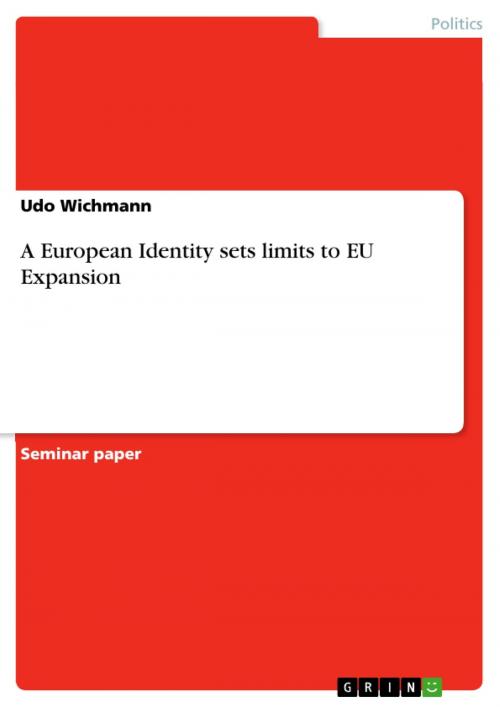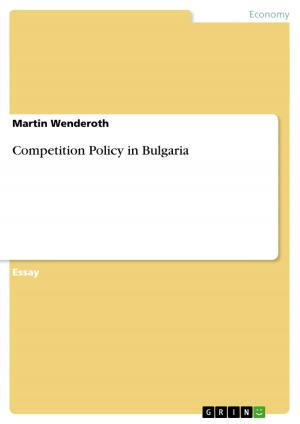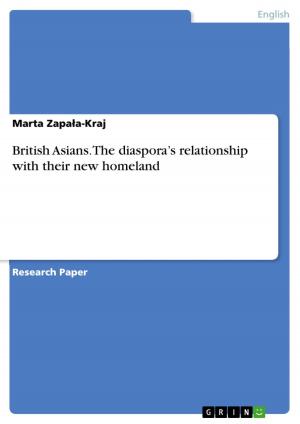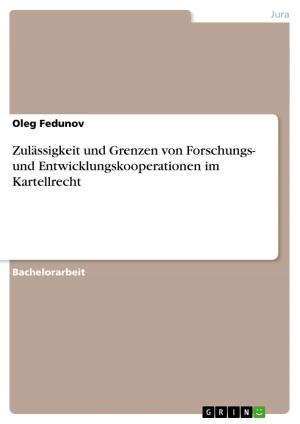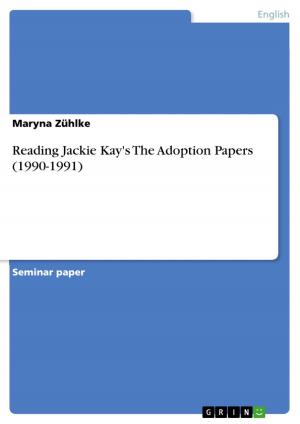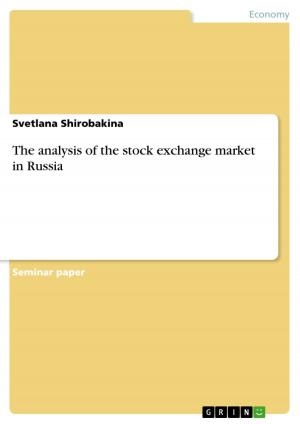A European Identity sets limits to EU Expansion
Nonfiction, Social & Cultural Studies, Political Science| Author: | Udo Wichmann | ISBN: | 9783640616923 |
| Publisher: | GRIN Publishing | Publication: | May 7, 2010 |
| Imprint: | GRIN Publishing | Language: | English |
| Author: | Udo Wichmann |
| ISBN: | 9783640616923 |
| Publisher: | GRIN Publishing |
| Publication: | May 7, 2010 |
| Imprint: | GRIN Publishing |
| Language: | English |
Seminar paper from the year 2009 in the subject Politics - International Politics - Topic: European Union, grade: 1,7, University of Marburg, language: English, abstract: The French philosopher Rémi Brague says that the European identity obtains its specific character directly and indirectly from the Christian religion, because Europe was formed through the Christianity . In addition to that, Samuel Huntington utters that religion is the central size for the delimitation of the different culture rooms and serves him for the de-finition of the limits of Europe . Nevertheless, Wolfgang Burgdorf says that the Christianity is not a reference point for an identity concept because the Islam and the Christianity contains many anti-enlightenment characteristics. Furthermore from a historical point of view, you have to consider flexible, territorial limits of Europe from which you cannot derive any territorial limit of Europe . The present member countries of the EU are in a Christian tradition line. The statement, whether countries, which are in the tradition line of another world religion, cannot be-come a member of the EU, is normative. The fact that for example Turkey isn't a Christian country isn't a reason to itself yet not to include them in the EU, because the religious freedom of the citizens is guaranteed by the EU and the freedom to be a Muslim is just included, too. The German historian Hans Ul-rich Wehler negates the statement, because from his point of view Turkey isn't a part of Europe concerning the geographical, historical, cultural and religious mentality . Who decides, whether the Christian values take a role within the EU? Do the Christian values have to be taken into account if you want to define a European identity? Which criteria have to be met regarding the limits of the EU? And how does the discussion show itself at a federal political level? At first, I will discuss these questions before I work out, whether a European identity of the EU expansion sets limits.
Seminar paper from the year 2009 in the subject Politics - International Politics - Topic: European Union, grade: 1,7, University of Marburg, language: English, abstract: The French philosopher Rémi Brague says that the European identity obtains its specific character directly and indirectly from the Christian religion, because Europe was formed through the Christianity . In addition to that, Samuel Huntington utters that religion is the central size for the delimitation of the different culture rooms and serves him for the de-finition of the limits of Europe . Nevertheless, Wolfgang Burgdorf says that the Christianity is not a reference point for an identity concept because the Islam and the Christianity contains many anti-enlightenment characteristics. Furthermore from a historical point of view, you have to consider flexible, territorial limits of Europe from which you cannot derive any territorial limit of Europe . The present member countries of the EU are in a Christian tradition line. The statement, whether countries, which are in the tradition line of another world religion, cannot be-come a member of the EU, is normative. The fact that for example Turkey isn't a Christian country isn't a reason to itself yet not to include them in the EU, because the religious freedom of the citizens is guaranteed by the EU and the freedom to be a Muslim is just included, too. The German historian Hans Ul-rich Wehler negates the statement, because from his point of view Turkey isn't a part of Europe concerning the geographical, historical, cultural and religious mentality . Who decides, whether the Christian values take a role within the EU? Do the Christian values have to be taken into account if you want to define a European identity? Which criteria have to be met regarding the limits of the EU? And how does the discussion show itself at a federal political level? At first, I will discuss these questions before I work out, whether a European identity of the EU expansion sets limits.
